The kuhane (dream soul) of Hau
Maka had hurried back to Hiva
(to Maori) after having been at
Ahu Akapu (E:11).
... She then hastened
her steps toward Ahu Akapu. There she
looked again for a residence for the
king. Again the dream soul of Hau Maka
spoke: 'May the king assemble his people
(?) and may he come in the midst of his
people from Oromanga to Papa O Pea. When
the king of Papa O Pea has assembled his
people (?) and has come to this place,
he reaches Ahu Akapu. To stay there, to
remain (for the rest of his life) at Ahu
Akapu, the king will abdicate (?) as
soon as he has become an old man.' She
named the place 'Ahu Akapu A Hau Maka O
Hiva.' The (entire) island she named 'Te
Pito O Te Kainga A Hau Maka O Hiva.'
The dream soul turned around and hurried
back to Hiva, to its (Home)land, to
Maori ...
|
Nga Kope
Ririva Tutuu Vai |
A Te Taanga |
|
Pu Mahore |
A Hau Maka O
Hiva
|
|
Poko Uri |
A Hau Maka I
[Sic!] Hiva |
|
Te Manavai |
A Hau Maka O
Hiva |
|
Te Kioe Uri |
|
Te Piringa
Aniva |
|
Te Pei |
|
Te Pou |
|
Hua Reva |
|
Akahanga |
|
Hatinga Te
Kohe |
|
Roto Iri Are |
|
Tama He Ika
Kino He Ihu Roroa |
|
One Tea
|
A Hau Maka O
Hiva |
|
Hanga Takaure |
|
Poike |
|
Pua Katiki |
|
Maunga Teatea |
|
Mahatua |
|
Taharoa |
|
Hanga Hoonu |
|
Rangi Meamea |
|
Peke Tau O
Hiti |
|
Maunga Hau
Epa |
|
Oromanga |
|
Hanga Moria
One |
|
Papa O Pea |
|
Ahu Akapu |
|
Te Pito O Te
Kainga
|
Also the Explorers went to Ahu Akapu
(E:30):
... On the
twenty-sixth day of the month of August
('Hora Iti') they went from Papa O Pea
to Ahu Akapu. They all went and reached
Ahu Akapu.
They looked
around and gave the name 'Ahu Akapu A
Hau Maka'.
They also saw (all of) Te Pito O Te
Kainga, looked around, and gave (the
whole island) the name 'Te Pito O Te
Kainga A Hau Maka' ...
This place was on the west coast of the
island:
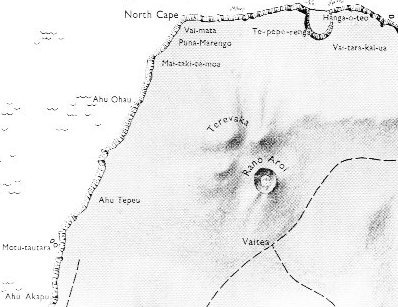
|
45 days |
|
7 days |
5 days |
1 day |
27 days |
5 days |
|
"July 11 (192) |
6 |
"July 18 (199) |
4 |
"July 23 (204) |
"July 24 (205) |
25 |
"Aug 19 (231) |
"Aug 20 (232) |
4 |
|
Te Anakena 11 |
Te Anakena 18 |
Te Anakena 23 |
Te Anakena 24 |
Hora Iti 19 |
Hora Iti 20 |
|
Hanga Takaure |
Hanga Hoonu |
Rangi Meamea |
Oromanga |
Papa O Pea |
| Ga4-6 (89) - (95) |
Ga4-13 (96) - (100) |
Ga4-18 (88 + 13) |
Ga4-19 (102) - (128) |
(129) - (133) |
| Cb6-12 (127) - (233) |
Cb6-19 (134) - (138) |
Cb6-24 (18 * 29½) |
Cb6-25 (140) - (166) |
(167) - (171) |
| tagata ka pau |
tagata rima oho ki te kihikihi - ki te ragi |
koia ra kua mau - i te ahi |
e tagata rogo |
|
Lono, v. Haw., to hear, observe, obey; pass., it is said, reported; s. report, fame, tidings. Sam., longo, to hear, report; s. sound; longoma, to hear; longonoa, be deaf; longo-longoa, be famed, renowned. Tah., roa, report, fame, notoriety; pa-roo, famous; tui-roo, id. Marqu., ono or oko (k for ng), sound, to hear. N. Zeal., rongo, to hear, to sound, report, news. Tong., ongo, sound, tidings. Fiji., rongo, id. Iaw., runu, to hear. By the usual sound exchange of l and n, perhaps the Haw. nana, to bark, to growl, and the N. Zeal. nganga, noise, uproar, refer themselves to this family. Sanskr., ran, to shout, to sound; rana, noise; rana-rana, mosquito. Pers., lânah, cry, noise; lândan, to cry, to bark; ka-rânah, a raven. Irish, lonach, talkative, a babbler; lon, a blackbird; r'an, ranach, a cry, roarings. Lat., rana, frog. A. Pictet (Orig. Ind.-Eur., i. 474) refers the Greek κορωνη, a crow, a jackdaw, to the Sanskrit ran. Perhaps the Swedish röna, to be aware of, to experience, apprendre, goes back to the Polynesian lono or the Sanskrit ran. Fornander. Rogorogo: Originally, 'orators, bards' of Mangareva. Borrowed into the Rapanui language in 1871, it came to generically signify the wooden tablets incised with glyphs, the writing system itself, and the respective inscriptions. Earlier the term ta was used for the writings. Fischer. Mgv.: rogouru, ten. Mq.: onohuu, okohuu, id. Churchill. |
 |
 |
 |
 |
 |
| Cb7-23 |
Cb7-24 (560 = 80 weeks) |
Cb7-25 → 360 |
Cb7-26 |
Cb7-27 (171 = 136 + 35) |
| CLOSE TO THE FULL MOON: |
| no star listed (193) |
κ Crucis (194.4), ψ Virginis (194.5), μ Crucis, λ Crucis (194.6), ALIOTH (Fat Tail) = ε Ursae Majoris, ι Oct. (194.8)
*153.0 = *194.4 - *41.4 |
MINELAUVA = δ Virginis (195.1), COR CAROLI = α Canum Ven. (195.3) |
δ Muscae (196.5), VINDEMIATRIX (Grape Gatherer) = ε Virginis (196.8 |
13h (197.8)
ξ¹ Centauri (197.1), ξ² Centauri (197.9) |
| Sept 30 (3 * 91) |
Oct 1 (91 + 183 = 274) |
2 |
3 |
4 |
| Hora Iti 20 |
"Aug 21 (274 - 41 = 233) |
22 (*154) |
23 |
24 (236 = 8 * 29½) |
| PAPA O PEA |
|
Pea. (Also peapea): To go away with bits of food or mud sticking to one's face or garments. Vanaga. Peaha, perhaps ... maybe, chance, doubtful; reoreo peaha ... Ma.: pea, perhaps. Peapea, an erasure ... hakapeapea ... Peau, to sweep all away. Ma.: peau, to be turned away. Churchill. Peau, a wave (Sa., To., Fu., Fotuna, Niuē, Mq., Nuguria); Mgv.: peau, peahu, id. Churchill 2.
... But in the fullness of time an obscure instinct led the eldest of them towards the anthill which had been occupied by the Nummo. He wore on his head a head-dress and to protect him from the sun, the wooden bowl he used for his food. He put his two feet into the opening of the anthill, that is of the earth's womb, and sank in slowly as if for a parturition a tergo. The whole of him thus entered into the earth, and his head itself disappeared. But he left on the ground, as evidence of his passage into that world, the bowl which had caught on the edges of the opening. All that remained on the anthill was the round wooden bowl, still bearing traces of the food and the finger-prints of its vanished owner, symbol of his body and of his human nature, as, in the animal world, is the skin which a reptile has shed ... |
| CLOSE TO THE SUN: |
| March 31 |
April 1 (91 = 274 - 183) |
2 |
3 |
4 |
| ACHIRD (Woman with Luminous Rays) = η Cassiopeiae (10.7) |
Legs-15 (Wolf)
ν Andromedae (11.0), φ² Ceti (11.1), ρ Phoenicis (11.2), η Andromedae (11.4)
*336.0 = *377.4 - *41.4 |
CIH (Whip) = γ Cassiopeiae, λ Tucanae (12.4), φ³ Ceti (12.6), μ Andromedae (12.8)
*337.0 = *378.4 - *41.4 |
φ4 Ceti (13.2) |
no star listed (14) |
|
... At the beginning of 44 B.C. - when Ceasar was still alive - the Senate decided to raise statues of him in all the temples and to sacrifice to him on his birthday in the month Quintilis, which in honour of him was renamed July. He was raised to the status of a god (among the other gods of the state) under the name Jupiter Julius. Marcus Antonius, who this year was consul together with Caesar, became high priest and responsible for the ceremonies. In the middle of February, at the time of the old feast of Lupercalia [Lupus = Wolf], he ran around naked and whipped the Roman ladies with thongs made from goat-skin [februa], in order to promote their fertility ... |
| 'March 4 (63 = 9 * 7) |
5 (91 - 27 = 64) |
6 |
7 |
8 |
| "Febr 18 |
19 (50) |
20 |
21 |
22 |
|
JAN 26 |
(8 * 8 + 3 * 3 * 3) |
28 |
29 |
30 |
| DAY 10 |
11 |
12 |
13 |
14 |
| Hetu erua |
tagata rere ki te ragi |
|
Hetu 1. To (make) sound; figuratively:
famous, renowned. 2. To crumble into embers (of a bonfire). Hetu'u. Star, planet; hetu'u popohaga
morning star; hetu'u ahiahi evening star; hetu'u viri meteorite. Vanaga Hetu 1. Star (heetuu); hetu rere, meteor; hetu pupura, planet. P Pau.: hetu, star. Mgv.: etu, id. Mq.: fetu, hetu, id. Ta.: fetu, fetia, id. The alternative form fetia in Tahiti, now the only one in common use, need not be regarded as an anomaly in mutation. It seems to derive from Paumotu fetika, a planet. Its introduction into Tahiti is due to the fashion of accepting Paumotu vocables which arose when the house of Pomare came into power. 2. Capital letter (? he tu). 3. To amuse. 4. To stamp the feet. Hetuhetu, to calk, to strike the water. Hetuke, sea urchin. Churchill. |
 |
 |
 |
| Cb8-1 (172 → solstice) |
Cb8-2 (565 = 392 + 173) |
Cb8-3 |
| CLOSE TO THE FULL MOON: |
| APAMI-ATSA (Child of Waters) = θ Virginis, ψ Hydrae (198.5), DIADEM = α Com. Ber. (198.9) |
AL DAFĪRAH (Tuft) = β Com. Ber. (199.4)
*158.0 = *199.4 - *41.4 |
σ Virginis (200.4)
*159.0 = *200.4 - *41.4 |
|
... Apami-Atsa ('Child of Waters', θ Virginis) at 13h maybe should be contrasted with Apam Napat ('Grandson of Waters') ... θ is on the front of the garment, below the girdle ... Moderns have no name for it, but in the Surya Siddhanta it was Apami-Atsa, the Child of the Waters ... Apam Napat is an eminent figure of the Indo-Iranian pantheon. In Hinduism, Apām Napāt is the god of fresh water, such as in rivers and lakes. In Zoroastrianism, Apąm Napāt is also a divinity of water ... Apām Napāt in Sanskrit and Apąm Napāt in Avestan mean 'grandson of waters' ... Sanskrit and Avestan napāt ('grandson') are cognate to Latin nepōs and English nephew, but the name Apām Napāt has also been compared to Etruscan Nethuns and Celtic Nechtan and Roman Neptune. In Yasht 19 of the Avesta Apąm Napāt appears as the Creator of mankind. Here, there is an evident link between the glory of sovereignty (Khvarenah) and Apąm Napāt who protects Khvarenah as the royal glory of Iranian kings. Apām Napāt is sometimes, for example in Rigveda book 2 hymn 35 verse 3, described as a fire-god who originates in water ... The reference to fire may have originally referred to flames from natural gas or oil seepages surfacing through water, as in a fire temple at Surakhany near Baku in Azerbaijan ... There is a conjecture that the word 'naphtha' came (via Greek, where it meant any sort of petroleum) from the name 'Apampat' ...

|
| Oct 5 |
6 |
7 (280) |
| 'Sept 8 |
9 |
10 (253 = 280 - 27) |
| "Aug 25 (237 = 8 * 29½ + 1) |
Hora iti 26 |
27 |
| (PAPA O PEA) |
AHU AKAPU |
|
Here above I have moved Ahu Akapu 1 day ahead, compared to my earlier presentations, in order to make it begin when the Full Moon reached Cb8-3 (→ 24).
Aka. 1. Anchor: he-hoa te aka, to drop anchor. 2. Root of certain plants (banana tree, taro, sugar-cane). 3. To be paralyzed by surprise. Vanaga. 1. Root; aka totoro, to take root. P Pau., Mq.: aka, root. Ta.: aa, id. 2. (āka) anchor. 3. Causative (haka). Churchill.
The Explorers stayed for 2 days in Ahu Akapu and Cb8-6 (→ 48) should therefore correspond to "September 29 when the Full Moon reached Spica. |
| CLOSE TO THE SUN: |
| April 5 (365 + 95 = 460) |
6 (96 = 80 + 16) |
7 |
|
1h (15.2)
β Phoenicis (15.1), υ Phoenicis, ι Tucanae (15.6), η Ceti, ζ Phoenicis (15.7) |
Al Batn Al Hūt-26 (Belly of the Fish) / Revati-28 (Prosperous) / 1-iku (Field Measure)
MIRACH (Girdle) = β Andromedae, KEUN MAN MUN (Camp's South Gate) = φ Andromedae (16.0), ANUNITUM = τ Piscium (16.5), REVATI (Abundant) = ζ Piscium (16.9)
REGULUS (α Leonis) |
ν Phoenicis (17.4), κ Tucanae (17.6)
*342.0 = *383.4 - *41.4
= *159.0 + *183.0 |
| 'March 9 (68) |
10 |
11 |
| "Febr 23 |
24 |
25 |
|
... The leap day was introduced as part of the Julian reform. The day following the Terminalia (February 23) was doubled, forming the 'bis sextum - literally 'double sixth', since February 24 was 'the sixth day before the Kalends of March' using Roman inclusive counting (March 1 was the 'first day'). Although exceptions exist, the first day of the bis sextum (February 24) was usually regarded as the intercalated or 'bissextile' day since the third century. February 29 came to be regarded as the leap day when the Roman system of numbering days was replaced by sequential numbering in the late Middle Ages ... |
Probably the dream soul hurried home because Spica was due to arrive, which was 4 * 29½ = 118 days before the time line up to the South Pole star (Dramasa, σ Octantis). I.e, from σ Virginis to σ Octantis there were *320 - *200 = *80 right ascension days.
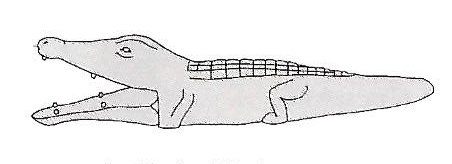
|
1 |
Horn |
α Virginis (Spica) |
Crocodile |
Oct 9 (282) |
|
2 |
Neck |
κ Virginis |
Dragon |
Oct 21 (294) |
|
3 |
Root |
α Librae (Zuben Elgenubi) |
Badger |
Oct 31 (304) |
|
4 |
Room |
π Scorpii (Vrischika) |
Hare |
Nov 17 (321) |
|
5 |
Heart |
σ Scorpii |
Fox |
Nov 23 (327) |
|
6 |
Tail |
μ Scorpii (Denebakrab) |
Tiger |
Nov 30 (334) |
|
7 |
Winnowing Basket |
γ Sagittarii (Nash) |
Leopard |
Dec 19 (353) |
|
December solstice |
|
8 |
South Dipper |
φ Sagittarii (?) |
Unicorn |
Dec 30 (364) |
|
9 |
Ox / Herd Boy |
β Capricornii (Dabih) |
Buffalo |
Jan 23 (388) |
|
10 |
Girl |
ε Aquarii (Albali) |
Bat |
Jan 29 (394) |
|
11 |
Emptiness |
β Aquarii (Sadalsud) |
Rat |
Febr 9 (405) |
|
12 |
Rooftop |
α Aquarii (Sadalmelik) |
Swallow |
Febr 18 (414) |
|
13 |
House |
α Pegasi (Markab) |
Pig |
March 5 (429) |
|
March equinox |
|
14 |
Wall |
γ Pegasi (Algenib) |
Porcupine |
March 22 (81) |
|
15 |
Legs |
η Andromedae (?) |
Wolf |
April 1 (91) |
|
16 |
Bond |
β Arietis (Sheratan) |
Dog |
April 17 (107) |
|
17 |
Stomach |
4¹ Arietis (Bharani) |
Pheasant |
May 1 (121) |
|
18 |
Hairy Head |
η Tauri (Alcyone) (?) |
Cockerel |
May 16 (136) |
|
19 |
Net |
ε Tauri (Ain) |
Crow |
May 25 (145) |
|
20 |
Turtle Head |
λ Orionis (Heka) |
Monkey |
June 12 (163) |
|
21 |
Three Stars |
ζ Orionis (Alnitak) |
Gibbon |
June 13 (164) |
|
June solstice |
|
22 |
Well |
μ Gemini (Tejat Posterior) |
Tapir |
June 24 (175) |
|
23 |
Ghost |
ρ Gemini ? |
Goat |
July 11 (192) |
|
24 |
Willow |
δ Hydrae |
Stag |
July 28 (209) |
|
25 |
Star |
α Hydrae (Alphard) |
Horse |
Aug 10 (222) |
|
26 |
Extended Net |
ε Hydrae / μ Hydrae |
Ox |
July 30 (211) / Aug 25 (237) |
|
27 |
Wings |
α Crateris (Alkes) |
Snake |
Sept 2 (245) |
|
28 |
Chariot |
γ Corvi (Gienah) |
Worm |
Sept 22 (265) |
|
September equinox |
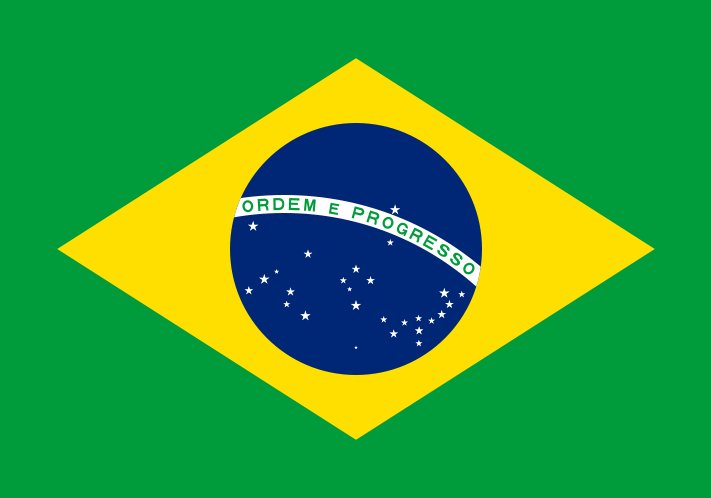
Although the dream soul felt compelled to return to Hiva the Explorers continued, and they 'behaved like turtles' - i.e. they went down to the surface of the sea similar to how Crocodiles were doing after having basked in the invigorating rays from the Sun.
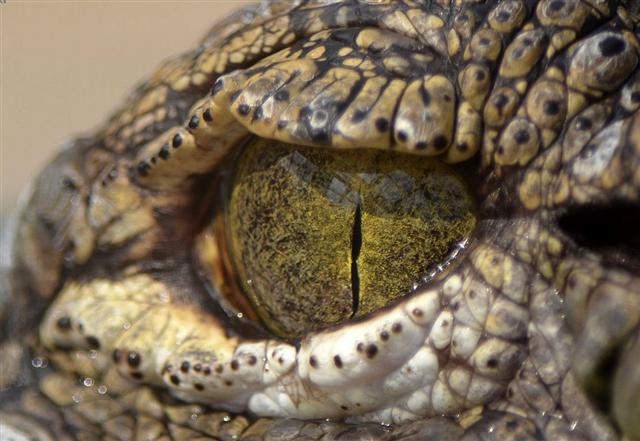
... They made camp [he noho] and rested [he hakaora] at Ahu Akapu for two days. On the twenty-ninth day of the month of August ('Hora Iti') they went on to Pu Pakakina. They arrived, remained there, and gave the name 'Pu Pakakina A Ira'. They remained one month in Pu Pakakina ...
| te hokohuki |
te moko |
vero hia |
tagata honui |
e ha mata |
|
Ha. 1. Four. 2. To breathe. Hakaha'a, to
flay, to skin. Vanaga. 1. Four. P Mgv., Mq., Ta.: ha, id. 2. To yawn, to gape. 3. To heat. 4. Hakaha, to skin, to flay; unahi hakaha, to scale fish. Mgv.: akaha, to take to pieces, to take off the bark or skin, to strip the leaves off sugarcane. 5. Mgv: ha, sacred, prohibited. Mq.: a, a sacred spot. Sa.: sa, id. Churchill. |
 |
 |
 |
 |
 |
| Cb8-4 |
Cb8-5 (172 + 4) |
Cb8-6 (177 = 6 * 29½) |
Cb8-7 (392 + 178 = 570) |
Cb8-8 (1½ * 314 + 100) |
| CLOSE TO THE FULL MOON: |
| γ Hydrae (201.0), ι Centauri (201.4) |
Al Simāk-12 (Lofty) / Chitra-14 (Bright One) / Horn-1 (Crocodile) / Sa-Sha-Shirū-20 (Virgin's Girdle) / ANA-ROTO-3 (Middle pillar)
MIZAR = ζ Ursae Majoris (202.4), SPICA = α Virginis, ALCOR = 80 Ursae Majoris (202.7)
SADALMELIK (α Aquarii)
*161.0 = *202.4 - *41.4 |
71 VIRGINIS (203.6) |
no star listed (204) |
HEZE = ζ Virginis (205.0), Southern Pinwheel Galaxy = M83 Hydrae (205.7) |
|
... Proclus informs us that the fox star nibbles continuously at the thong of the yoke which holds together heaven and earth; German folklore adds that when the fox succeeds, the world will come to its end. This fox star is no other than Alcor, the small star g near zeta Ursae Majoris (in India Arundati, the common wife of the Seven Rishis, alpha-eta Ursae ... |
| Oct 8 (240 + 41) |
9 |
10 |
11 (364 - 80) |
12 (285) |
| 'Sept 11 (354 - 100) |
12 |
13 (256 = 4 * 64) |
14 |
15 |
| "Aug 28 (240) |
Hora iti 29 |
30 (242 = 2 * 11 * 11) |
31 |
"Sept 1 |
| AHU AKAPU |
PU PAKAKINA A IRA |
| CLOSE TO THE SUN: |
| April 8 |
9 |
10 (100) |
11 |
12 |
| no star listed (18) |
ADHIL (Garment's Train) = ξ Andromedae (19.3), θ Ceti (19.7) |
KSORA (Knee) = δ Cassiopeiae (20.1), ω Andromedae (20.6), γ Phoenicis (20.8) |
δ Phoenicis (21.5) |
υ Andromedae (22.9) |
| 'March 12 |
13 |
14 (73) |
15 |
16 |
| "Febr 26 |
27 |
28 (59) |
29 |
"March 1 |
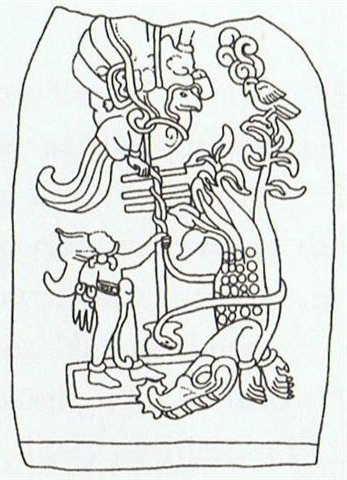
|















